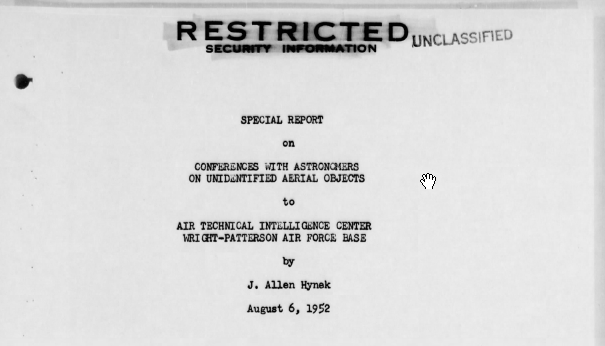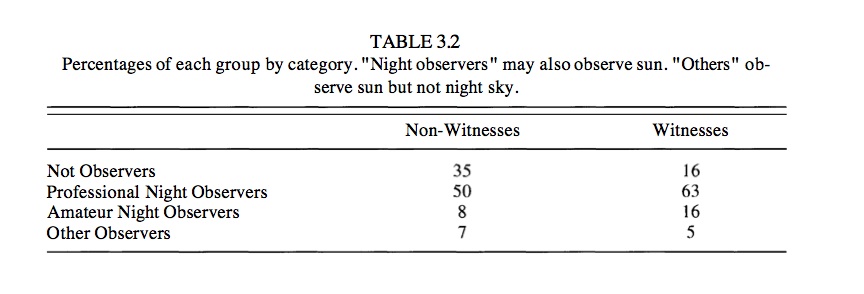From Huffington Post:
Lord Martin Rees recently offered The Huffington Post his opinion about UFOs:
“No serious astronomer gives any credence to any of these stories … I think most astronomers would dismiss these. I dismiss them because if aliens had made the great effort to traverse interstellar distances to come here, they wouldn’t just meet a few well-known cranks, make a few circles in corn fields and go away again.”
Such sweeping statements from well regarded scientists are endlessly frustrating to the UFO researcher. Particularly given that interest in UFOs actually drives some people to study astronomy! Unfortunately the idea that only kooks see UFOs is prevalent.
But because Lord Rees is a scientist, the correct answer is to provide him with scientific data that is directly relevant to his claim. I am aware of only three attempts to scientifically gauge what percentage of astronomers see UFOs. Two show that not only do astronomers see UFOs in America, but many are afraid to report their sightings because they fear professional and public ridicule. The final source indicates that astronomers see UFOs at a dramatically greater rate than the general population.
On August 6, 1952, Astronomer J. Allen Hynek offered the USAF’s Project Blue Book a “Special Report on Conferences with Astronomers on Unidentified Aerial Objects.”
Hynek interviewed some 45 astronomers on their experiences and opinions about UFOs during and following the meeting of the American Astronomical Society that June. Hynek provides some notes on each individual astronomer and their opinions. Here’s what some astronomers thought in 1952:
Astronomer Y (no sightings) said, “If I saw one, I wouldn’t say anything about it.”
Astronomer II (two sightings) “is willing to cooperate but does not wish to have notoriety,” Hynek reports.
Astronomer OO: (one sighting) was a new observer at the Harvard Meteor Station in New Mexico. He saw two lights moving in parallel that were too fast for a plane and too slow for a meteor. He had not reported his observation.
Hynek concluded: “Over 40 astronomers were interviewed of which five had made sightings of one sort or another. This is a higher percentage than among the populace at large. Perhaps this is to be expected, since astronomers do, after all, watch the skies.”
The next data point comes from 1977. Dr. Peter Sturrock made a questionnaire about UFO attitudes and experiences. Again the target was the members of the American Astronomical Society. The paper was eventually printed in 1994 in the Journal of Scientific Exploration, a peer-reviewed but decidedly non-mainstream publication.
Sturrock received 1,356 responses from 2,611 questionnaires. Sixty-two astronomers responded that they had observed something they could not explain which could be relevant to the UFO phenomenon. Eighteen of those witnesses said they had previously reported their sightings, and Sturrock notes that a 30% reporting rate is greater than what is assumed for the average population. Section 3.2 of the paper titled “Comparison of Witnesses and Non-Witnesses” contains a table showing that UFO witnessees were actually more likely to be night sky observers (professional or amateur) while non-witnesses are more likely to not even be observing the skies at all!
Sturrock also includes commentary from the astronomers, and again a sample is illuminating:
C1. “I object to being quizzed about this obvious nonsense. Unidentified = unobserved or factually unrecorded: modern mythology. Too much respectability given to it.”
C1O. “l find it tough to make a living as an astronomer these days. It would be professionally suicidal to devote significant time to UFOs. However, I am quite interested in your survey.”
C16. “Menzel and Condon have made further investigation unnecessary unless some really new phenomena are reported … There is no pattern to UFO reports except that they predominantly come from unreliable observers.”
I could add more, but I want folks to read Mack’s article.
Rees’ comments are not unusual for the conservative scientific community at large and in turn benefit the military-industrial-complex which runs the U.S. and most world governments. The MIC doesn’t want any release of technology that is derived(?) from supposed alien technology because it would destroy the present world order. They prefer a slow “leak” of tech in dribs and dabs which doesn’t rock the boat much. Apples Ipod and other Smart Phone technologies are relatively innocuous in that they are primarily for games and other entertainment that distracts the younger population from more important concerns.
Astronomers and UFOs: A Response to the Lord Martin Rees
Hat tip to the Daily Grail.


